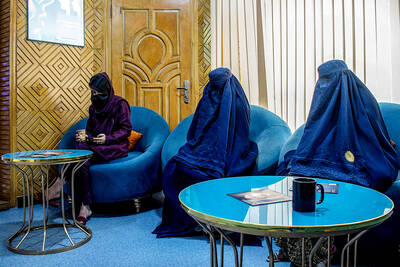Climate change could more than triple the risk of catastrophic wildfires in parts of Australia, a top environmental group warned yesterday, almost a year since savage firestorms that killed 173 people.
Greenpeace warned that, without a new climate treaty to replace the Kyoto Protocol, the frequency of severe fire danger in drought-parched southeastern Australia would grow threefold by 2050.
“Catastrophic” conditions similar to those ahead of last February’s so-called “Black Saturday” wildfires, which killed 173 people in towns around Melbourne would occur once every three years, instead of once in every 33.
“The frequency of catastrophic fire danger could increase more than tenfold in Melbourne, and the number of total fire ban days could triple in Sydney, Adelaide and Canberra by 2050,” a Greenpeace report entitled Future Risk said.
If targets for emission cuts proposed by world leaders at last month’s Copenhagen summit were adopted in a new global treaty, southeastern Australia would still face at least a doubling of severe fire risk, Greenpeace said.
“If we do nothing to address climate change we are knowingly placing more lives and property at risk,” Greenpeace chief executive officer Linda Selvey said.
According to the report, temperatures in Australia had warmed an average 0.9ºC since 1950, with the greatest intensification of heat in the country’s east, which was accompanied by markedly declining rainfall.
“Hotter, drier weather is a recipe for bushfire disaster in regions of Australia home to the majority of the population,” it said, adding that the changing climate had “noticeably” prolonged the annual fire season.
The Feb. 7 Black Saturday fires were the worst natural disaster in Australia’s modern history, with one expert likening their intensity to the energy produced by 1,500 Hiroshima atomic bombs.
More than 2,000 homes were destroyed, killing 173 people and injuring more than 400.

DEADLOCK: Putin has vowed to continue fighting unless Ukraine cedes more land, while talks have been paused with no immediate results expected, the Kremlin said Russia on Friday said that peace talks with Kyiv were on “pause” as Ukrainian President Volodymyr Zelenskiy warned that Russian President Vladimir Putin still wanted to capture the whole of Ukraine. Meanwhile, US President Donald Trump said that he was running out of patience with Putin, and the NATO alliance said it would bolster its eastern front after Russian drones were shot down in Polish airspace this week. The latest blow to faltering diplomacy came as Russia’s army staged major military drills with its key ally Belarus. Despite Trump forcing the warring sides to hold direct talks and hosting Putin in Alaska, there

North Korea has executed people for watching or distributing foreign television shows, including popular South Korean dramas, as part of an intensifying crackdown on personal freedoms, a UN human rights report said on Friday. Surveillance has grown more pervasive since 2014 with the help of new technologies, while punishments have become harsher — including the introduction of the death penalty for offences such as sharing foreign TV dramas, the report said. The curbs make North Korea the most restrictive country in the world, said the 14-page UN report, which was based on interviews with more than 300 witnesses and victims who had

COMFORT WOMEN CLASH: Japan has strongly rejected South Korean court rulings ordering the government to provide reparations to Korean victims of sexual slavery The Japanese government yesterday defended its stance on wartime sexual slavery and described South Korean court rulings ordering Japanese compensation as violations of international law, after UN investigators criticized Tokyo for failing to ensure truth-finding and reparations for the victims. In its own response to UN human rights rapporteurs, South Korea called on Japan to “squarely face up to our painful history” and cited how Tokyo’s refusal to comply with court orders have denied the victims payment. The statements underscored how the two Asian US allies still hold key differences on the issue, even as they pause their on-and-off disputes over historical

Decked out with fake crystal chandeliers and velvet sofas, cosmetic surgery clinics in Afghanistan’s capital are a world away from the austerity of Taliban rule, where Botox, lip filler and hair transplants reign. Despite the Taliban authorities’ strict theocratic rule, and prevailing conservatism and poverty in Afghanistan, the 20 or so clinics in Kabul have flourished since the end of decades of war in the country. Foreign doctors, especially from Turkey, travel to Kabul to train Afghans, who equally undertake internships in Istanbul, while equipment is imported from Asia or Europe. In the waiting rooms, the clientele is often well-off and includes men